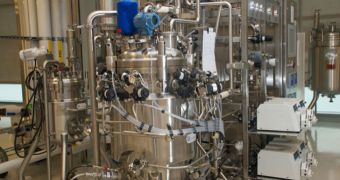The US Department of Energy (DOE)’s Lawrence Berkeley National Laboratory (Berkeley Lab) just inaugurated a new research facility, whose main purpose is to boost the country's leadership in biofuel research. The installation is dedicated to studying all aspects of converting biomass to fuel.
The new center is called the Advanced Biofuels Process Demonstration Unit (ABPDU), and its primary objective is to develop a source of transportation fuel that could replace gasoline on a gallon-for gallon basis in engines widely used today.
DOE officials decided to build ABPDU's state-of-the-art facility in Emeryville, California. A 15,000-square-foot complex is now awaiting science team to begin studying biofuel conversion. The center also needs to promote the commercialization of advanced next-generation biofuels as soon as possible.
Analysts say it will also provide an industry-scale test bed for a wide variety of discoveries made in scientific lab. Other research groups may also bring their work at this installation, for verification.
The biofuels industry has the potential to provide numerous jobs, granted that some background and support are provided at first. It uses cellulosic biomass to generate advanced biofuels that may be used for numerous applications. The biomass is selected from materials not used as feed sources or food.
One of the main reasons why burning biofuels is cleaner and safer than using fossil fuels is that they are carbon-neutral. This means that their emissions do not contribute to an increase in greenhouse gas emissions. These gases are responsible for the climate change our planet is currently going through.
“The Advanced Biofuels Process Demonstration Unit will serve the efforts of major biofuels research across the nation – including the Bioenergy Research Centers in the DOE Office of Science,” Berkeley Lab director Paul Alivisatos explained.
Berkeley Lab was able to house the new facility thanks to a $20 million grant from the DOE Office of Energy Efficiency and Renewable Energy (EERE).
“The establishment by EERE of this facility at Berkeley Lab, a DOE Office of Science national laboratory, reflects a new spirit of cooperation between the DOE technology and science programs. Berkeley Lab is proud to play its part,” Alivisatos explains.
“Berkeley Lab has a history of bringing scientific solutions to some of the toughest questions concerning energy, and the mission of the ABPDU is consistent with that history, “Berkeley Lab Deputy Director Horst Simon said during the ABPDU ribbon-cutting ceremony.

 14 DAY TRIAL //
14 DAY TRIAL //